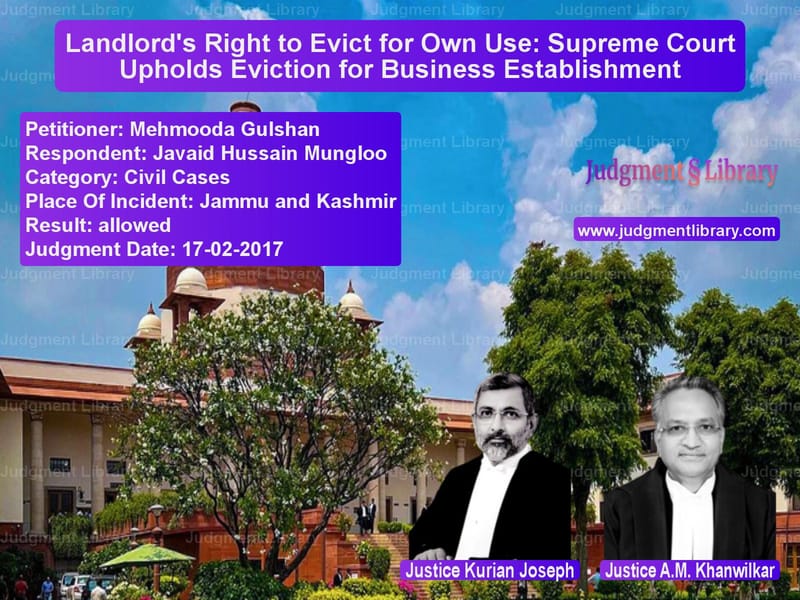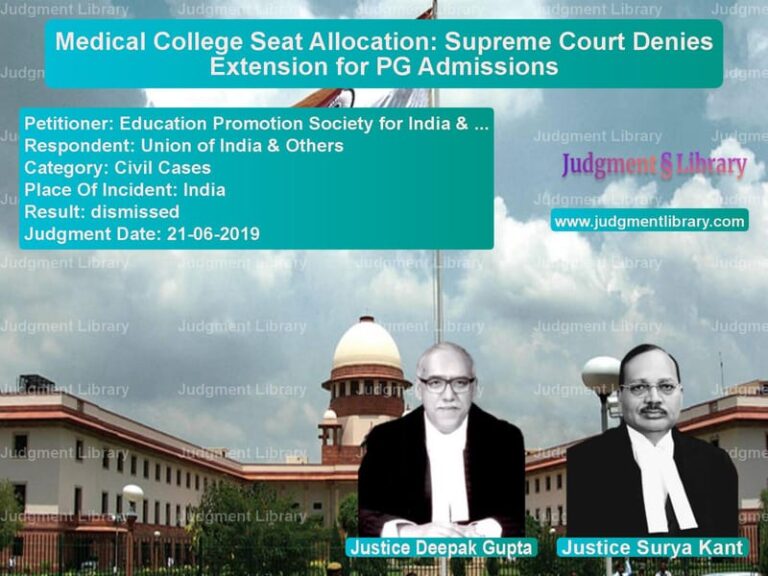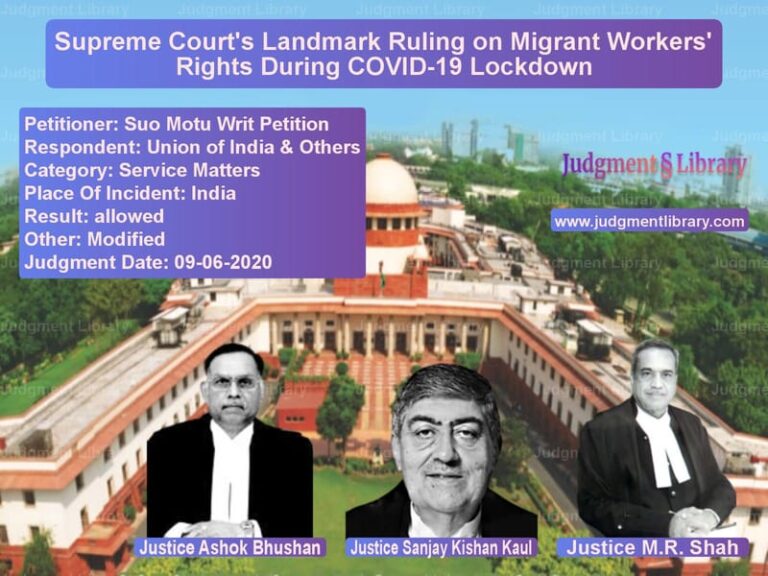Landlord’s Right to Evict for Own Use: Supreme Court Upholds Eviction for Business Establishment
Introduction
The case of Mehmooda Gulshan v. Javaid Hussain Mungloo raised a fundamental question about a landlord’s right to evict a tenant when the premises are required for personal use, particularly for the landlord’s family member. The Supreme Court of India, in this significant judgment, examined whether a landlord’s requirement for occupation could extend to a family member, specifically in a situation where the premises were needed to establish a business for an unemployed son.
The case, originating from a dispute under the Jammu and Kashmir Houses and Shop Rent Control Act, 1966, revolved around whether the eviction suit filed by the landlord had merit based on the necessity of the premises for her son’s employment.
Background of the Case
The appellant, Mehmooda Gulshan, filed Civil Suit No. 42 of 2000 seeking eviction of the respondent, Javaid Hussain Mungloo, from a rented property. The tenancy commenced on November 15, 1997, for a period of eleven months. The landlord contended that:
- The tenancy was verbally extended for another eleven months.
- The tenant refused to vacate the premises despite the extended period expiring.
- The premises were required for her own use, specifically to set up a business for her unemployed son.
The tenant, however, argued that the extension was for eleven years and that he had a valid claim to continue occupancy.
Grounds for Eviction
The plaintiff cited several reasons for requiring the premises:
- Her husband had deserted the family and remarried in Bangalore.
- She was left alone with two sons, one of whom, Shujat Hyder, was unemployed and unable to secure government or private employment.
- She had no source of income and wanted to provide her son with a means to support the family by starting a business in the rented property.
- The son’s qualifications were insufficient for formal employment, leaving business as the only viable option.
Legal Issues Considered
The trial court framed six key issues, two of which were central to the appeal:
- Whether the plaintiff required the premises for her unemployed son?
- What was the comparative advantage and disadvantage of the parties?
The trial court ruled in favor of the plaintiff, holding that her need was genuine and not merely a desire. The court emphasized that:
“Every parent has a cherished desire to get his or her ward settled in some job so that he can have a sustenance in his life.”
Since the plaintiff had no other commercial property, and the rental income was inadequate to sustain the family, the court determined that eviction was justified.
High Court’s Reversal
On appeal, the Jammu and Kashmir High Court overturned the trial court’s decision, stating that:
- The landlord’s son was not examined as a witness, which weakened the claim of personal requirement.
- No evidence was provided regarding the nature of the intended business or the son’s ability to run it.
- The burden of proof lay with the landlord, and mere statements were insufficient.
The Division Bench upheld the High Court’s ruling, leading to the present appeal before the Supreme Court.
Supreme Court’s Observations
The Supreme Court examined the case under Section 11(1)(h) of the Jammu and Kashmir Houses and Shop Rent Control Act, which allows eviction if:
“The house or shop is reasonably required by the landlord either for purposes of building or re-building, or for his own occupation or for the occupation of any person for whose benefit the house or shop is held.”
The Court noted several flaws in the High Court’s reasoning:
- The requirement of reasonable necessity does not mandate the personal testimony of the family member for whose benefit eviction is sought.
- The landlord’s evidence sufficiently established that she had no alternative source of income.
- Precedents in Bega Begum v. Abdul Ahad Khan and Joginder Pal v. Naval Kishore Behal confirmed that the term “own occupation” could include usage by family members.
The Court further held:
“Mere non-examination of the family member who intends to do the business cannot be taken as a ground for repelling the reasonable requirement of the landlord.”
The Supreme Court concluded that the eviction request was based on genuine need rather than mere desire.
Final Judgment
The Supreme Court ruled in favor of the landlord, stating:
- The trial court’s findings were correctly based on evidence and legal principles.
- The High Court had erroneously elevated procedural technicalities over substantive justice.
- The need for business establishment for an unemployed son was legitimate and warranted eviction.
The Court directed the tenant to vacate the premises within three months.
Conclusion
This landmark judgment reaffirmed the rights of landlords to reclaim property for genuine personal use, particularly when it serves a critical livelihood purpose. It also clarified that legal interpretations should favor substantive justice over procedural hurdles, ensuring that rightful claimants receive the protection of law.
Don’t miss out on the full details! Download the complete judgment in PDF format below and gain valuable insights instantly!
Download Judgment: Mehmooda Gulshan vs Javaid Hussain Mungl Supreme Court of India Judgment Dated 17-02-2017.pdf
Direct Downlaod Judgment: Direct downlaod this Judgment
See all petitions in Landlord-Tenant Disputes
See all petitions in Property Disputes
See all petitions in Judgment by Kurian Joseph
See all petitions in Judgment by A M Khanwilkar
See all petitions in allowed
See all petitions in supreme court of India judgments February 2017
See all petitions in 2017 judgments
See all posts in Civil Cases Category
See all allowed petitions in Civil Cases Category
See all Dismissed petitions in Civil Cases Category
See all partially allowed petitions in Civil Cases Category







